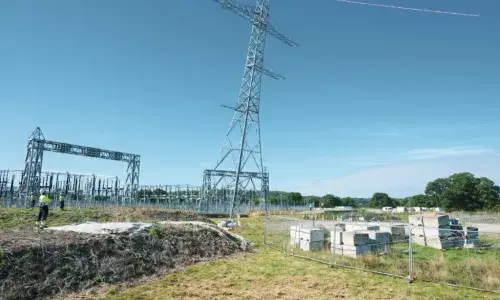
Our love is electric – research reveals UK obsession with all things electric
- 65% of people spend five hours or more cosying up with their electric gadgets over Christmas Day and Boxing Day.
- A quarter of Brits (24%) can’t live without their smartphone according to new research
- Just under a quarter (23%) said the smart TV is their favourite electrical gadget of all time
- Three quarters of Londoners spend five hours on Christmas Day and Boxing Day using entertainment gadgets, compared to just over half in the northeast
It’s official, we Brits are addicted to electrical gadgets. New research from National Grid has found that two thirds of respondents spend five hours or more with their gadgets on Christmas Day and Boxing Day and 36% confessed that they bought at least one electrical gadget in the Black Friday sales this year. You could call it love, after all there are 20 songs with the word electric in the title and 100’s featuring power.
In fact, according to the latest research, the average home has over thirteen electrical devices and use a whopping ten of them every day. When asked what items they use daily, the TV pipped the smartphone to the top spot by just one percent, with a whopping 76% and 75% respectively. In third place were the larger domestic appliances including the kettle, toaster, dishwasher, and fridge.
Surprisingly therefore, when asked what item they couldn’t live without, a quarter of people (24%) said the smartphone, with the TV coming in second at just 12%. Incredibly back in 1953 when the National Grid became supercharged, only 350,000 homes had a TV which is in stark contrast to the 27.3 million [1] that have one now.
In those 70 years, we have filled our homes with an array of electrical gadgets, from TVs to games consoles, tablets, laptops, mobile phones, and smart devices. In fact, electricity demand has grown by approximately four times in the last 70 years and will increase by a further 50% by 2035 as people adopt electric vehicles and electric heating systems in their homes.
To celebrate the supergrid turning 70 in 2023 and the launch of The Great Grid Upgrade, National Grid launched a survey asking 2,000 UK consumers about their love of all things electric.
Jade Kimpton, Apprentice Substation Engineer at National Grid said: “It’s amazing to think just how much electricity impacts our lives and everything we do. From a cup of tea to a chat with friends and family, to microwaving the popcorn and sitting down for a movie, it’s so easy to switch-on, to help us switch-off.
“Electrical gadgets have become part of our everyday lives and in the next decade demand for electricity is expected to increase by a further 50 per cent as more people adopt electric vehicles and heating systems. To make sure we have the power we need, in the right place, at the right time, electricity generation needs to treble, and we need to build five times more power lines and pylons in the next seven years as has been built in the last 30. We call it the Great Grid Upgrade, the largest overhaul of the electricity grid in generations.”
Understanding why we have so many electrical gadgets, one fifth of Brits said the internet and smartphones were the biggest game-changer and the most significant technology advancement to impact the number of items in their homes. Considering that the Office of National Statistics states that approximately 26% of all retail sales are online[2], that’s perhaps not surprising.
Looking to the future, a third (33%) of Brits said that if they could invent an electric product to help with any mundane task it would be cleaning the entire house, with 12% confessing it would be to change the beds. Surprisingly, when asked which inventor and gadget has given modern life the greatest upgrade, the vote was split, with the majority (13%) said Thomas Edison and the lightbulb, which was invented in 1879 and the TV coming in second at 12%.
It seems therefore that whilst technology has enabled a great many things, perhaps it’s the simple ones that make the most difference. In fact, 26% of people said that there was no future technology that would give their lives a big upgrade, whereas just under 20% said clean energy would do it for them.
ENDS
[2] Retail sales, Great Britain - Office for National Statistics (ons.gov.uk)




